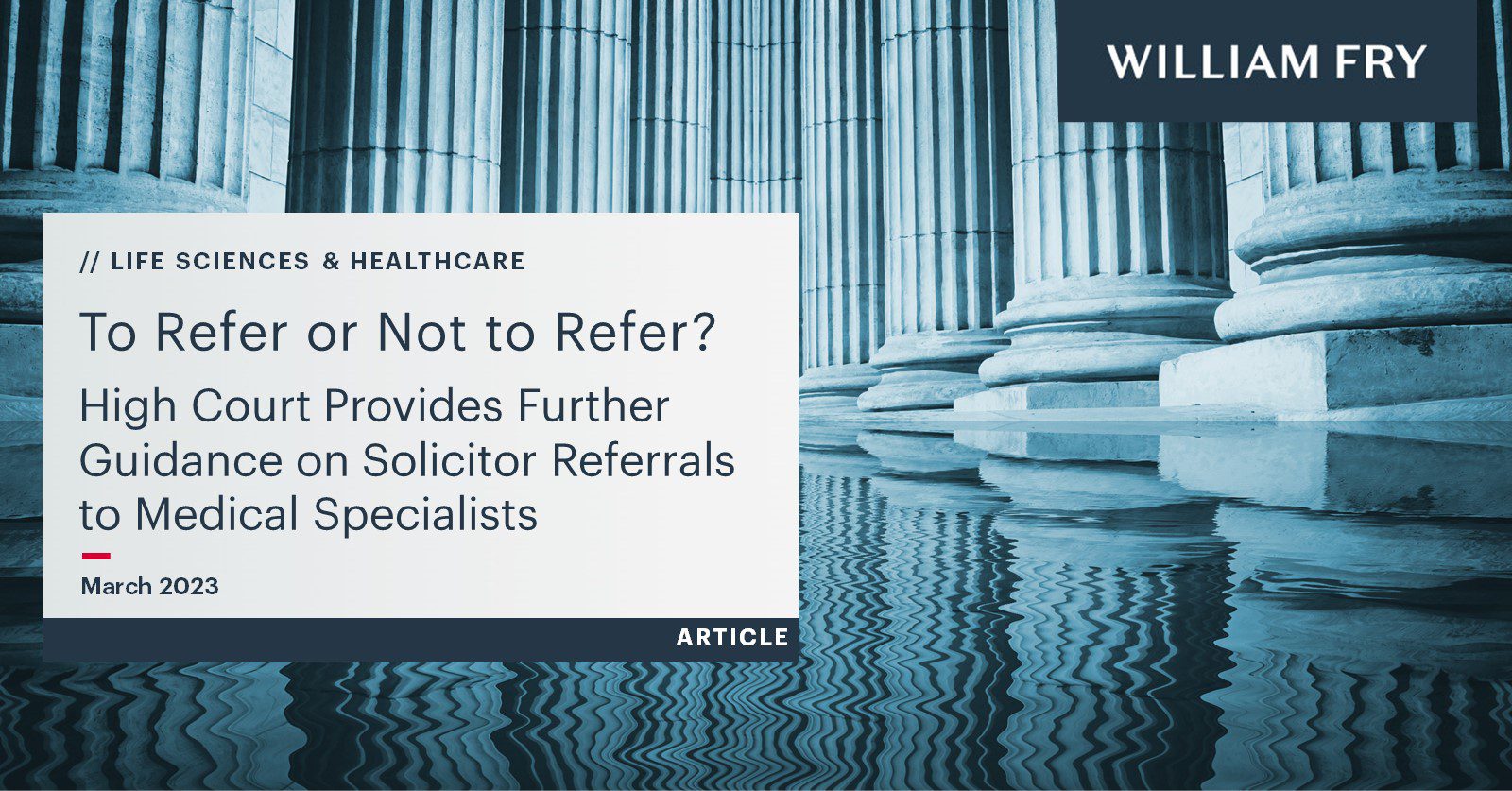Expert evidence is at the heart of all litigation. It can make or break any case.
There has been a flurry of recent case law discussing the proper approach to instructing expert witnesses; in particular the appropriateness of solicitors instructing medical experts to prepare condition and prognosis reports where the plaintiff is not a patient of that medical expert. Condition and prognosis reports, whether prepared by the treating doctor or an independent medical expert, are relied on in all personal injury and product liability cases that result in personal injuries. They enable the court to appraise the plaintiff’s alleged injuries.
Background
The case of McLoughlin v Dealey & HSE [2023] IEHC 106 (McLoughlin) considered whether the court should attach less weight to evidence of an orthopaedic surgeon who was called to give evidence, on the basis that the plaintiff had been referred to that expert directly by her solicitor, rather than her GP.
The plaintiff suffered a back injury at work, following which she decided that she could not continue her career as a nurse due to its physically demanding nature. The plaintiff’s GP medical notes, produced in court, did not record any ongoing complaints of back pain in the two and a half years following the accident. The plaintiff claimed she was managing the pain and did not feel the need to bring it to her GP’s attention. The plaintiff’s solicitor referred her to an orthopaedic surgeon who prepared three reports following examinations and consultations with the plaintiff. This evidence was subject to scrutiny by the court.
Recent case law
In Sarah Cahill v Brian Forristal and Rachel O’Riordan v Brian Forristal [2022] IEHC 705 [discussed here], the plaintiffs’ solicitor made the referral to an orthopaedic surgeon and a consultant psychiatrist rather than the plaintiffs’ GP.
Twomey J opined that a plaintiff’s GP should make medical referrals to consultants, who would have the benefit of access to the plaintiff’s medical history. He found that referrals by solicitors amounted to prima facie evidence that there was no medical basis for the referral, thereby affecting a plaintiff’s credibility and their injuries allegedly suffered.
Twomey J did accept that solicitor referrals may be appropriate in certain circumstances, and he noted that a defendant would be entitled to refer a plaintiff to a different consultant, of the same speciality, for a second opinion.
Findings of the High Court in McLoughlin
Ferriter J in McLoughlin held that a solicitor is entitled, in accordance with their duties to their client, to advise a plaintiff to engage the services of a medical expert. He further stated that there is no provision in Irish law or the rules of court that requires a plaintiff in a personal injuries action to only call a treating doctor with whom they have an ongoing relationship. There is nothing in principle prohibiting an independent medical expert being called on behalf of a plaintiff.
However, Ferriter J highlighted the importance of ensuring that any independently retained expert is properly informed as to the plaintiff’s relevant medical history (i.e., they must be briefed with all relevant information and past medical history). They should also have appropriate opportunity to examine the plaintiff. Further, they should provide their expert opinion to the court objectively and in accordance with their overriding duty to the court. Ferriter J opined that a solicitor who does not ensure that any expert engaged by them complies with the legal requirements imposed, will not be doing their best by their client. This applies to solicitors on both sides of personal injury litigation.
Ferriter J concluded that there was no breach of the duty owed to the court in this case, and the full appropriate weight was granted to the evidence. As the plaintiff had given an accurate representation of her medical history, the expert was not hindered in their judgment. The court also noted that defendants are permitted to have a plaintiff examined by medical experts of their choice, provided court rules are followed and relevant information, including medical records, are provided.
Law Society protocol for commissioning medical reports
Following the above judgments, on 24 March 2023, the Litigation Committee of the Law Society issued a “Protocol for Commissioning Medical Reports” (Protocol), addressing the issue of solicitors commissioning reports directly from medical practitioners. The Law Society states that the principles set out by Ferriter J underpin the Protocol, which they recommend solicitors follow.
Contact Us
If you wish to discuss the topics discussed in this article, please contact Mary Cooney or your usual William Fry contact.
Contributed by Grainne Carr & Hannah Garvey


